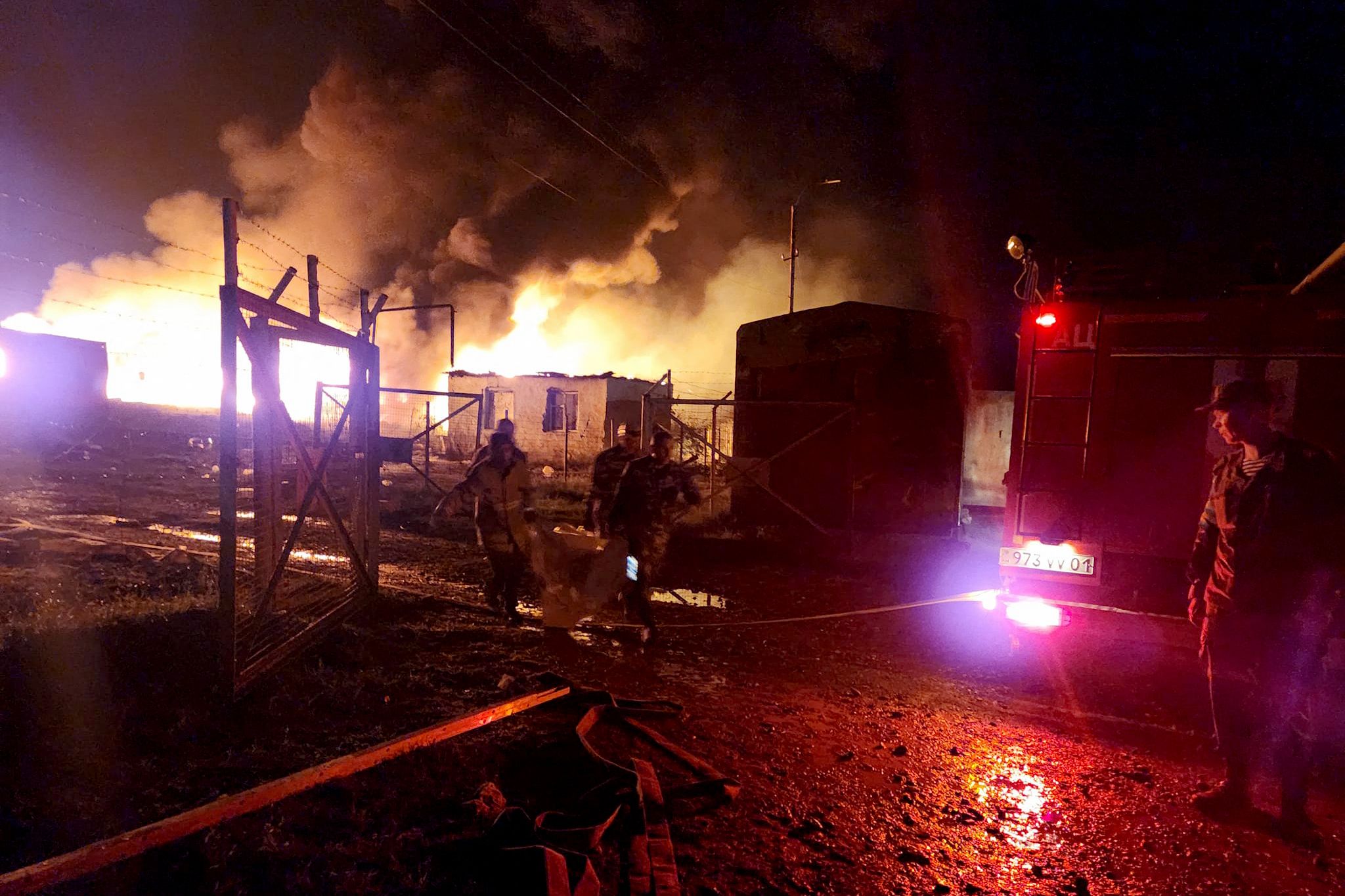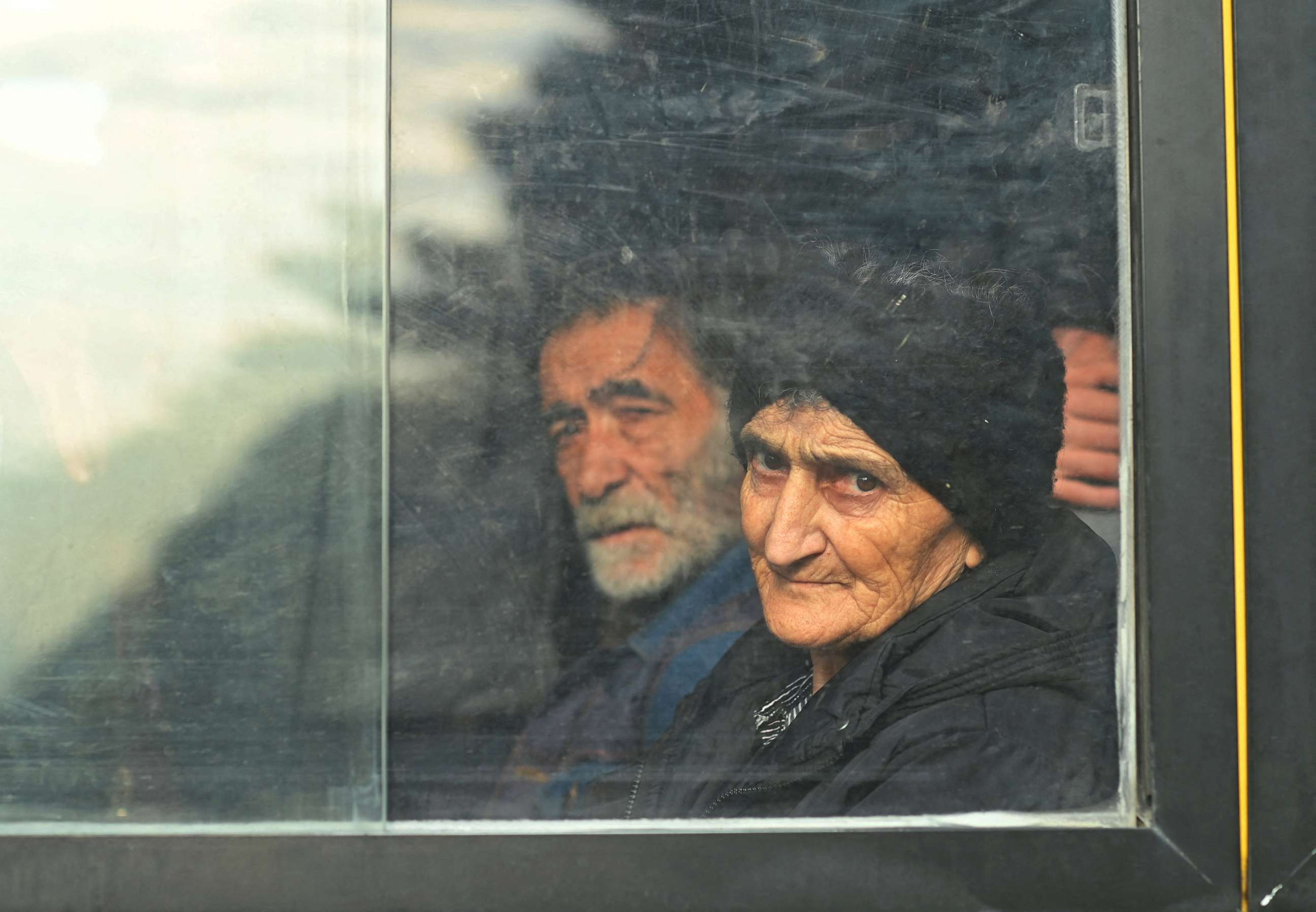Large explosion rocks warehouse as thousands of ethnic Armenians start to flee disputed enclave
Over 6,600 people had reportedly crossed into Armenia by Monday evening.
LONDON -- A large explosion has reportedly torn through a fuel store being used by ethnic Armenia refugees amidst their exodus from the disputed enclave of Nagorno-Karabakh. Thousands of ethnic Armenians have started fleeing from Nagorno-Karabakh following Azerbaijan’s successful military offensive to retake control of the region last week.
The explosion occurred at a fuel depot close to the Stepanakert-Askeran highway that leads from the enclave's capital, according to the enclave’s ethnic Armenian authorities. The explosion caused a large fire, according to the Ministry of Internal Affairs of the unrecognized Nagorno-Karabakh Republic. Local authorities said casualties and injuries were still being recorded, but local media reported it was feared dozens could be dead and injured.
Gas was reportedly being handed out to refugees trying to leave the enclave, that has been suffering fuel shortages.


At least 6,650 people had crossed the border into Armenia by Monday evening, according to an Armenian government statement quoted by the Russian state news agencies, with over three thousand arriving in just several hours.
An adviser to the enclave’s ethnic Armenians leadership on Sunday told Reuters that virtually its entire population -- estimated at 120,000 -- would now leave. If they stayed, they would be "ethnically cleansed" by Azerbaijan, he said.
"Our people do not want to live as part of Azerbaijan," David Babayan, the adviser, told Reuters on Sunday. "Ninety-nine point nine percent prefer to leave our historic lands."
Reporters on the border reported dozens of civilian cars and other vehicles have been driving to the crossing since Sunday, when Azerbaijan begin permitting some people to exit. Reuters reported that groups of civilians in the region’s capital, called Stepanakert by Armenians, were seen loading and packing belongings onto buses. Armenian authorities said they are prepared for tens of thousands of families to flee.
Azerbaijan has blockaded Nagorno-Karabakh for nine months prior to last week's offensive and controls the only main route out. On Sunday it allowed the first civilians to leave, reportedly escorted by Russian peacekeepers.


Azerbaijan launched an offensive last week that in just two days of fighting defeated the ethnic Armenia authorities in the enclave, who laid down their arms and agreed to disband their military forces. Nagorno-Karabakh is recognized internationally as part of Azerbaijan but has been controlled by ethnic Armenians for most of the last 35 years following a bloody war between Armenia and Azerbaijan amid the break up of the Soviet Union. Hundreds of thousands of Azerbaijani civilians were also driven out of Karabakh by Armenian forces during the war in the 1990s.
Azerbaijan reopened the conflict in 2020, launching a full-scale war that decisively defeated Armenia and forced its government to largely abandon its claims to it. Last week's new offensive, that killed and wounded hundreds, finally defeated the enclave's ethnic Armenian authorities, restoring Azerbaijan's control.
Amid the crisis, Samantha Power, the head of USAID and a vocal campaigner on human rights, landed in Armenia's capital on Monday.
"At this important moment for the country and region, I’m here to reiterate the U.S.'s strong support & partnership with Armenia and to speak directly with those impacted by the humanitarian crisis in Nagorno-Karabakh," Power wrote on X, formerly known as Twitter.
The U.S. and other western countries have expressed concerns for the ethnic Armenians in the enclave, warning Azerbaijan it must ensure their security and rights.

Azerbaijani troops have been halted on the edge of the enclave's capital since end of the offensive, during which Azerbaijan already seized a number of villages and cut off roads leading to some. Power cuts and shortages of food, medicine and water have been reported, with thousands of displaced people sheltering in the city.
Azerbaijan has said it wants to “reintegrate” the Armenian population but has not presented any plan for doing so or for safeguarding their rights. In areas of Nagorno-Karabakh that it has previously retaken, Azerbaijan has encouraged Azerbaijanis to come resettle and some Armenian cultural sites have been erased or damaged.

Azerbaijan's president Ilham Aliyev on Monday hosted Turkey's president Recep Tayyip Erdogan, who has strongly backed Azerbaijan, including providing weapons and military advisors. The two met in Azerbaijan's Nakhchivan enclave, which is separated from the rest of Azerbaijan by southern Armenia and that Aliyev has threatened to use force to reconnect with a corridor.
"I am certain that the process of integration of the Armenian population of Karabakh will go successfully," Aliyev said at the meeting, according to the Russian news agency TASS. He added that all residents of the enclave were "Azerbaijan citizens."
A second round of talks between Azerbaijan and Karabakh Armenian leadership was held on Monday in the Azerbaijani city of Yevlakh, in which the sides reportedly discussed establishing facilities for urgent medical in Nagorno-Karabakh.




